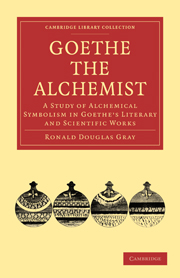Summary
This book sets out to show that Goethe was profoundly influenced throughout his life by the religious and philosophical beliefs he derived from his early study of alchemy. Alchemy can be interpreted in many ways: as the art of gold-making, as a symbolical representation of mystical doctrines, or, as in the writings of C. G. Jung, as a projection of the unconscious mind, concerned with the integration of the personality. As Goethe knew it, it was primarily concerned with mysticism. In his hands, however, it underwent some transformation: the mystical aspect became less important, while he attempted to provide more logical, more scientific evidence of the symbolical truth of alchemy.
It is essential to distinguish clearly between alchemy, mysticism, and neo-Platonism. Alchemy was not necessarily mystical, if the word is used, as it was by William James, to indicate a belief in the possibility of ecstatic, ineffable union with the divine such as is often said to be achieved by contemplation. Nor was it identical with neo-Platonism, in spite of its many affinities. That Goethe was influenced by neo-Platonism is an obvious fact, which I do not wish to deny. Alchemy was, however, the form in which he first encountered neo-Platonism, and it is in alchemical symbols that Goethe expresses himself in his scientific works.
- Type
- Chapter
- Information
- Goethe the AlchemistA Study of Alchemical Symbolism in Goethe’s Literary and Scientific Works, pp. ix - xPublisher: Cambridge University PressPrint publication year: 2010First published in: 1952

